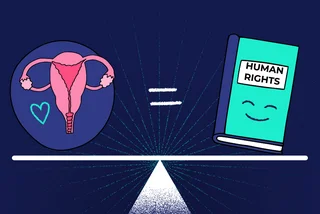Laws on abortions for foreign women in the Czech Republic need to change, the Czech Medical Chamber (CLK) said in response to an Amnesty International (AI) report on human rights in individual countries worldwide.
The law, established in 1986, states: “A woman shall apply in writing for an artificial termination of pregnancy to the female doctor of the health care facility competent according to her place of residence or place of work or school.” A legal opinion by the CLK has deemed the terminology “communist and obsolete.”
Under the Penal Code, a doctor performing an abortion in violation of this law can face up to five years in prison.
Lack of clarity surrounding law
“Many medical facilities have refused to provide abortions to non-EU citizens due to erroneous claims by the CLK – consistently denied by the Ministry of Health and the Ombudsman’s Office – that the law prohibits it,” the AI report stated.
The Health Ministry maintains that a decree supplementing the abortion law includes provisions regulating terminations for foreign women. It clarifies that foreign women holding residence permits under special regulations or international agreements are not considered temporary residents.
The CLK disagrees with the Ministry of Health’s interpretation of the 2015 European directive on free movement. The CLK maintains that foreign women without permanent residence in the Czech Republic should not be given these medical procedures. CLK’s legal opinion states that the directive does not directly change national legislation and must be incorporated into EU law to be enforceable.
CLK lawyers assert that the Ministry of Health must propose an amendment to the abortion law to align with the EU directive. The ministry’s interpretation may only be considered a mitigating factor, not automatic impunity.
Foreigners face obstacles accessing abortion
Abortion upon request is legal in most European countries and is permitted in the Czech Republic up to the 12th week and up to the 24th week in the case of fetal genetic abnormalities.
In Poland, abortions are restricted to cases of rape, incest, or threat to the mother’s life. Current debates in the Polish parliament aim to relax abortion regulations, though a presidential veto is anticipated. Polish women frequently seek abortions in the Czech Republic.
A 2023 report by Ciocia Czesia, an organization that helps Polish women seeking abortion in Czechia, contacted nearly 80 state-run hospital gynecology departments posing as EU citizens seeking abortion. Forty percent of clinics declined to do the procedure, and 12 percent couldn’t provide a clear response, sometimes redirecting callers to department heads or legal advisors for clarification.
The AI report also criticizes the Czech Republic for discrimination against and hate speech towards Ukrainian refugees, arms exports to the Middle East, ongoing segregation of Roma children in schools, and insufficient support for sexual minority rights.













 Reading time: 2 minutes
Reading time: 2 minutes 




























